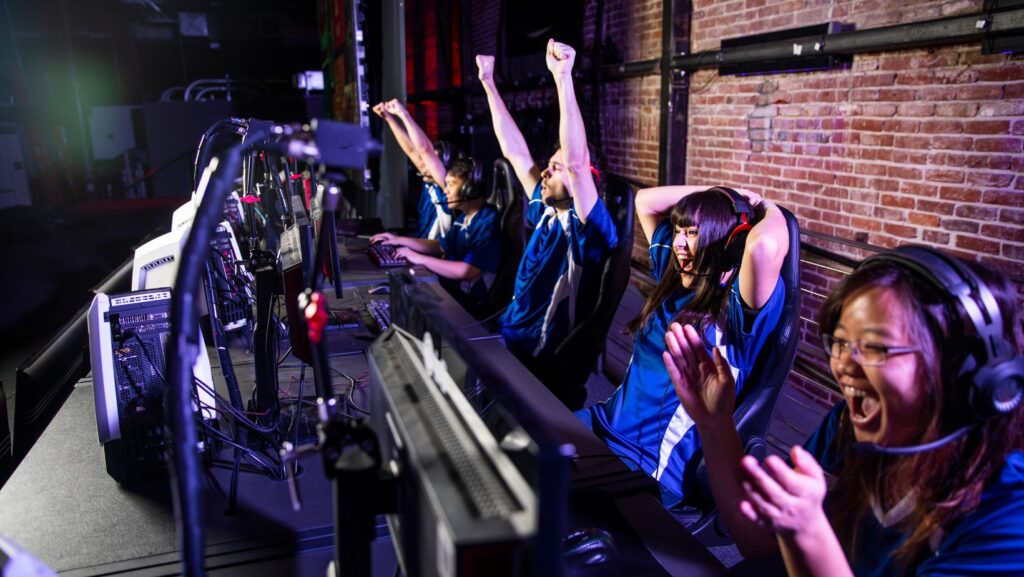In the electrifying world of esports, teams like FaZe Clan, Team Liquid, and Cloud9 aren’t just playing games; they’re shaping an industry. With millions tuning in to watch top-tier players compete in games like League of Legends, Dota 2, and Overwatch, esports teams have transcended their niche origins to become titans of entertainment and sport. These teams are not only about competition; they’re about community, innovation, and pushing the boundaries of what gaming can be.
Esport Teams
Evolution of Competitive Gaming
 Esport teams have transformed competitive gaming from a niche hobby into a global phenomenon. Initially, competitive gaming involved small groups of individuals competing in local arcades and online matches. However, the formation of organized teams introduced a new level of professionalism and spectacle. Esport teams now operate as sophisticated entities, merging talent management, strategic gameplay, and brand partnerships to excel in competitions. This shift not only heightened the level of play but also expanded the audience, attracting sponsors and mainstream media attention.
Esport teams have transformed competitive gaming from a niche hobby into a global phenomenon. Initially, competitive gaming involved small groups of individuals competing in local arcades and online matches. However, the formation of organized teams introduced a new level of professionalism and spectacle. Esport teams now operate as sophisticated entities, merging talent management, strategic gameplay, and brand partnerships to excel in competitions. This shift not only heightened the level of play but also expanded the audience, attracting sponsors and mainstream media attention.
Major Milestones in Esport History
The history of esport teams is marked by several key milestones that highlight their growth and influence. In 1997, the Red Annihilation tournament for the game Quake is considered one of the first major esports events, setting the stage for professional gaming. Fast forward to 2013, when the League of Legends Championship Series was launched, it marked a significant point, offering a stable, league-based format for teams to compete regularly. Another transformative milestone came in 2019 when the Fortnite World Cup offered a staggering $30 million prize pool, underscoring esports’ lucrative potential and its mass appeal. Each of these milestones reflects the evolving status of esport teams and their pivotal role in shaping the competitive gaming landscape.
Key Components of Successful Esport Teams
Team Composition and Roles
 structure of esport teams is pivotal for their success, combining various roles that cater to different aspects of gameplay. Key roles include players, coaches, analysts, and support staff. Players are the core of the team, each specializing in specific game aspects like strategy, execution, or teamwork. Coaches oversee the development of game strategies and ensure players reach their peak performance, while analysts focus on studying game patterns and opposing teams to provide competitive insights. Support staff, such as psychologists and physical therapists, enhance player well-being, ensuring they remain at their best in high-stress environments.
structure of esport teams is pivotal for their success, combining various roles that cater to different aspects of gameplay. Key roles include players, coaches, analysts, and support staff. Players are the core of the team, each specializing in specific game aspects like strategy, execution, or teamwork. Coaches oversee the development of game strategies and ensure players reach their peak performance, while analysts focus on studying game patterns and opposing teams to provide competitive insights. Support staff, such as psychologists and physical therapists, enhance player well-being, ensuring they remain at their best in high-stress environments.
Training and Strategy
Consistent training sessions and strategic planning are cornerstones for any successful esport team. Teams engage in rigorous daily training routines designed to enhance individual skills and foster team cohesion. Strategy sessions involve analyzing past games and scouting opponents, identifying strength and weakness patterns. Coaches and analysts play crucial roles, developing tactics and adapting them based on real-time game developments. Implementing advanced technologies and software for simulated practice sessions enhances this training, allowing players to refine tactics and decision-making in controlled environments. This structured approach not only boosts performance but also prepares teams to handle the pressures of competitive tournaments effectively.
Geographic Influence on Esport Teams
 The geographic location of esport teams significantly impacts their strategic options, audience reach, and player recruitment. Teams based in tech-centric regions such as South Korea and the United States benefit from advanced infrastructure and a rich pool of talent. For instance, South Korea’s Seoul and the United States’ Los Angeles boast numerous teams, owing to their high-speed internet and gaming culture. These locations also provide teams greater access to training facilities, marketing capabilities, and sponsorships, further enhancing their competitive edge. Conversely, teams in areas with less developed digital infrastructure might face challenges in matching the connectivity and speed that are crucial for high-level esports competition.
The geographic location of esport teams significantly impacts their strategic options, audience reach, and player recruitment. Teams based in tech-centric regions such as South Korea and the United States benefit from advanced infrastructure and a rich pool of talent. For instance, South Korea’s Seoul and the United States’ Los Angeles boast numerous teams, owing to their high-speed internet and gaming culture. These locations also provide teams greater access to training facilities, marketing capabilities, and sponsorships, further enhancing their competitive edge. Conversely, teams in areas with less developed digital infrastructure might face challenges in matching the connectivity and speed that are crucial for high-level esports competition.
The Business of Esports
Understanding the business of esports teams reveals a complex matrix of revenue streams including sponsorships, media rights, merchandise sales, and tournament winnings. Esport teams, such as FaZe Clan, Team Liquid, and Cloud9, operate within ecosystems similar to traditional sports, leveraging brand partnerships and fan bases for financial growth. Sponsorships play a pivotal role, with companies keen to associate their brands with top teams to tap into a vibrant, global audience. Merchandise, which encompasses everything from jerseys to gaming peripherals, provides another significant income channel. Media rights deals offer teams exposure and direct revenue from streaming platforms devoted to esports viewership.

